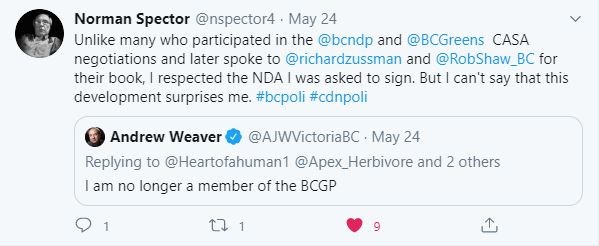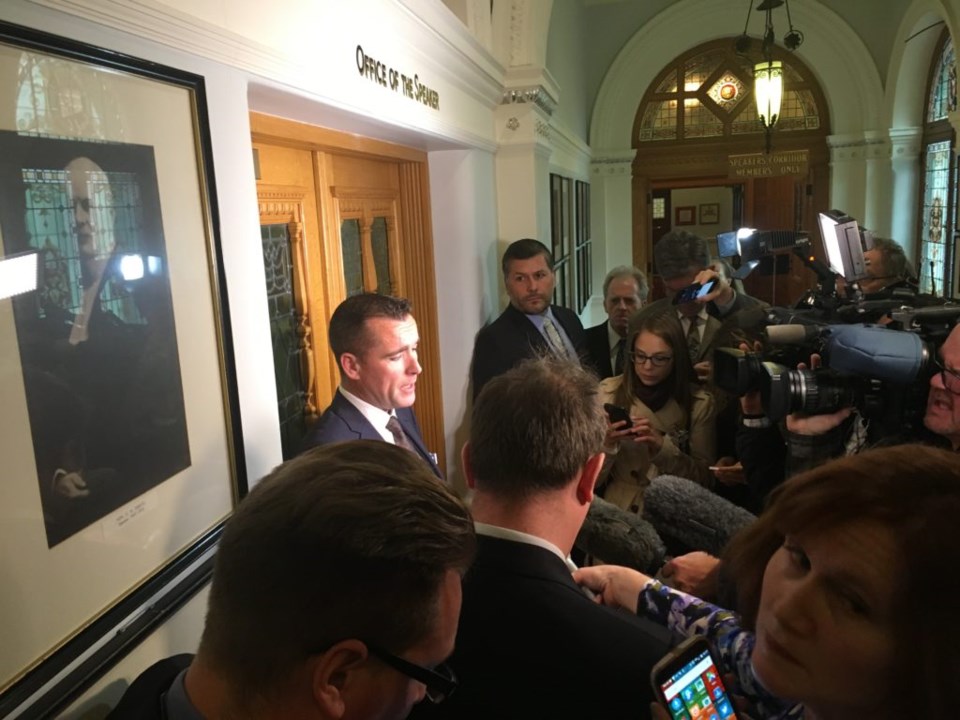Green civil war (or, Judean People’s Front vs. The People’s Front of Judea)
On Saturday night, former BC Green leader (and indeed, former BC Green member) Andrew Weaver criticized his former colleague Sonia Furstenau.

Furstenau had tweeted about possibly following New Zealand on adopting a four-day work week. “An absolutely kooky idea,” Weaver tweeted. “Classic decision-based evidence-making.” (Without any comment on those involved, the latter is a great line.) To make sure it was seen more widely, he added the hashtag #bcpoli.
And seen more widely, it was.
It would have been a pointed snipe at a dedicated and career-long political opponent; but Furstenau and Weaver had been caucus colleagues as recently as last year. In the Team BC era of pandemic politics, it really stood out.
Where is this coming from? As others have observed, tensions between Weaver and his former colleague had been simmering in the background for some time.

Weaver hasn’t exactly been coy about his overall dissatisfaction; he also tweeted he was ready to try and force an election over the NDP government's pursuit of an expanded LNG industry. And he told me last year he was intending to walk away from the party he led from a fringe movement to official party status and junior partner in a minority government.
“It’s really been really tough with the Green Party,” says Weaver.
“Probably, the most difficult part is the level of political naivety. I see it all the time as I see these incredibly well-meaning Green supporters on Twitter who are…I mean, it’s a lovely level of naivety. It’s lovely. I mean, it’s lovely in that I wish there was more of this, but it’s a bit like the Christians being fed to the lions.”
That was in December. Since then, there have been more potential wedges other than LNG, from the Wet’suwet’en disputes, to how to react to protesters surrounding the legislature, some of whom (allegedly) assaulted some female staffers.
All that said, Saturday night’s shot across the bow at the presumptive favourite to succeed him as Green leader still came as a shock – and a jarring contrast with his immediately previous tweet, directed at BC Liberal leader Andrew Wilkinson.

Politics, as usual
In a province with a well-earned reputation for no-holds-barred politics, the pandemic has been remarkable for a level of cooperation simply absent in other provinces or Ottawa.
But after mostly keeping their powder dry through the pandemic, the opposition BC Liberals seem to have judged that it’s time to resume asking pointed questions.
Late last week, the NDP government announced the disappearance of a $2.9 billion WorkSafeBC surplus. “It’s almost all gone,” Labour Minister Harry Bains told Rob Shaw of The Vancouver Sun.
It was a stunning revelation; the WorkSafe surplus had been built after years of employers paying premiums into the system. In recent years, other provinces had refunded employers for their own workers compensation fund surpluses. The NDP government was apparently entertaining a similar idea to help employers reeling from the COVID-19 economic shutdown.
Some had suggested using the surplus to help employers purchase Personal Protective Equipment (PPE) and other COVID-19 precautions to protect workers and defray some costs. Now, the surplus had mysteriously vanished.
WorkSafeBC later jumped in to correct its minister, noting “only” $1 billion was lost. This is obviously better, but an official contradicting a minister who subsequently refused interview requests paints a picture of confusion behind the scenes.
It's important to note this is an investment portfolio, not a checking account that has been overdrawn and spent dry - and it won't be the only portfolio damaged by the pandemic. But while the stock market dropped precipitously in March, it has since rebounded and clawed back roughly half those losses.
In the meantime, there was a a gap between Bains’ comments and his own officials. Judging by both chatter and online reaction, this is an area the BC Liberals might target when questions resume next month – along with the refusal to reduce ICBC premiums during the pandemic, cost overruns on infrastructure projects from Community Benefits Agreements, and more.
As the ledge turns
The legislature has generated no shortage of drama over the last two years, much centred around the Speaker’s Office and non-elected officers, such as the Clerk and Sergeant-at-Arms. One episode in particular looks set to continue over the summer.
Last summer, Speaker Darryl Plecas’ chief of staff Alan Mullen and an unnamed contractor toured several provincial and state capitols, driving for weeks to look at security systems and structures in broadly comparable legislatures. (Always sensitive to how he’s characterized in the media, Mullen particularly bristles at calling this a “road trip.”)

Mullen and Plecas promised a report would be forthcoming last fall, but it never materialized. Earlier this week, Mullen confirmed he has in fact delivered his promised report to LAMC, the legislature committee that manages and runs the business of the legislative assembly. It's only a matter of time before it's shared with the public.
Besides the nuts and bolts of the report, which may well be valuable, it will be interesting to see if it clears up some unanswered questions. Namely, who was the unnamed contractor representing the legislative assembly with Mullen, and could this report have been accomplished with video conference or phone interviews?
The other area of interest will be recommendations. The legislative assembly still hasn’t found a new sergeant-at-arms. This is interesting, because not long after the former clerk and sergeant-at-arms were removed, it emerged that Plecas had floated the idea of Mullen replacing the sergeant – a position that involves sometimes carrying a sidearm, usually recruited from among the police and armed forces veterans who make up the legislature’s protective services.
This idea was quickly shot down, but there has since been speculation about splitting the sergeant-at-arms position into two roles.
This may or may not be a good idea (after all, we haven’t seen the report) but it’s hard not to imagine Plecas might once again suggest Mullen for one of those posts.
For one thing, it would be a more secure job. Should Plecas choose not to run again, or fail to win back his seat, Mullen is so closely tied with the current Speaker that it’s difficult to see him continuing in the same role.
Plecas has generally found ways to get what he wants; it will be interesting to see if that might continue with a plum appointment for his loyal chief of staff.
Maclean Kay is Editor-in-Chief of The Orca
SWIM ON:
- Last week, Maclean Kay was a (literally) pale imitation of George Affleck in UnSpun 72.
- Maclean also looked at Port Coquitlam Mayor Brad West's other job, and pondered whether it's a problem.
- Roslyn Kunin offers five tips for adapting, surviving, and (dare to dream) thriving even under the pandemic.


